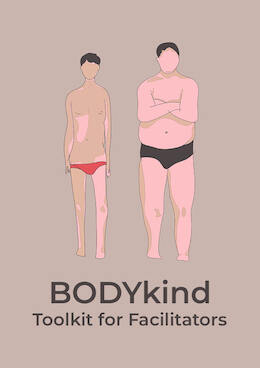Toolbox — For Training and Youth Work
All new tools in your inbox: Be the first to know about new tools for learning with our e-mail notifications.
Manual
BODYkind - Toolkit for Facilitators
Ideas and methods to lead conversations with young people about their bodies and body image, aiming to boost their confidence, self-esteem, participation and appreciation of diversity.
Aims of the tool
Educator Susan Bauer writes that ‘young people know little about their bodies, but ironically, they are intensively focused on their bodies, often in unhealthy ways. They think about their appearance, weight, physical skills, and how their peers perceive them. With all this focus on their bodies, the actual study of the body is mostly omitted from the school curricula. The silence around the body is of concern for young people since the body is a source of positive and negative self-esteem.’
The BODYkind project aims to transform educational practices where bodies and body image of learners are neglected or, in some cases, even damaged. We wish to break the silence Susan Bauer is writing about. This toolkit offers ideas and methods to lead conversations with young people about their bodies and body image, aiming to boost their confidence.
Description of the tool
This toolkit includes outlines of eight modules covering various body image-related topics, along with brief input and guidelines for facilitators. The toolkit is based on the principles and values of non-formal education, while the essential element of all the activities is young people learning from and supporting each other.
The first module INTRODUCTION TO BODY IMAGE offers a review of the topic and importance of body image. It will help initiate a conversation about body image challenges and explain key terms.
The second module BODIES IN MEDIA is focused on media and social media and their impact on body image. It aims to enhance critical thinking skills, media literacy, and invites young people to create their own BODYkind content.
The third module BODY STEREOTYPES will allow you to explore body-related stereotypes and implicit biases. You can use it to improve understanding of connections between body perception and social inclusion.
The fourth module SHAME AND BOUNDARIES tackles the topic of body shaming and setting one’s boundaries. Many young people have requested to include this topic in the programme of workshops and short training courses, as it offers some practical solutions on how to stand up for oneself and peers.
The fifth and sixth modules EMBODIED ARTS and FINDING YOUR MOVEMENT offer activities to improve one’s body image through intuitive and creative exercises. The activities from these modules can be incorporated into arts and even sports lessons.
The seventh module BODY IMAGE AND IDENTITY explores how bodies are connected with developing and expressing our identities. It invites young people to reflect on who they are, what their values are, and how they present all that to the rest of the world.
In the eighth module BODY AS A PROTEST, we suggest utilising all the learnings about our bodies and their relations to social norms, values, culture, inclusion, equality, identity, and community to bring about change in young people’s schools, organisations, and communities.
The toolkit includes also different supportive materials: cards, audio exercises, short videos, interviews with experts. Additional materials are available on the website of the project - www.BODYkind.life.
Available downloads:
Disclaimer
SALTO cannot be held responsible for the inappropriate use of these training tools. Always adapt training tools to your aims, context, target group and to your own skills! These tools have been used in a variety of formats and situations. Please notify SALTO should you know about the origin of or copyright on this tool.
Tool overview

http://toolbox.salto-youth.net/4650
This tool addresses
Social Inclusion, Personal Development, Youth Participation
It is recommended for use in:
Youth Exchanges
Duration:
The toolkit offers enough ideas to create up to 24 hours long learning programs.
Behind the tool
The tool was created by
Ilze Jēče, Lada Matyášová, Inese Minšī, Tina Miteva, Iskra Gerazova Mujchin, Ilona Olehlová
The tool was published to the Toolbox by
Inese Minsi (on 17 May 2025)
and last modified
29 December 2024
Comments
No comments have been posted yet.
If you want to comment on this tool, you need to be signed in with your MySALTO account. Sign in now